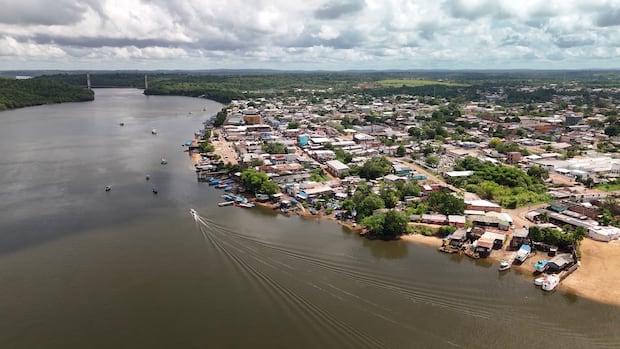World
Brazil’s Oil Ambitions Clash with Climate Pledges at COP30

At the forefront of Brazil’s climate discourse, the state-owned oil company Petrobras has initiated exploratory drilling approximately 170 kilometres off the Amazonian coast. This development coincides with the opening of the world’s largest climate conference, COP30, in Belém. President Luiz Inácio Lula da Silva emphasized the need for a new development model devoid of fossil fuel dependence while simultaneously overseeing a potential oil boom in the Foz do Amazonas basin.
Environmental advocates, such as Suely Araújo, public policy coordinator at Brazil’s Climate Observatory, have raised concerns about the government’s decision to increase oil production amid a global climate crisis. Brazil ranks as the eighth largest oil producer, and Araújo noted that expanding production now is counterintuitive.
As COP30 kicks off, Belém is hosting tens of thousands of delegates and observers. Accommodations are limited, with some delegates housed on anchored cruise ships. The conference aims to galvanize efforts to combat fossil fuel emissions and promote the transition to sustainable energy sources. President Lula assured that some oil revenues would be directed toward fostering this transition.
In Oiapoque, a city of 27,000 residents, the prospect of oil deposits has sparked optimism among locals. Romeu Costa, who manages the local airport, expressed hope that oil exploration will stimulate economic development. “It will develop the city,” he stated, as real estate speculation begins to rise with the influx of workers flying in for drilling operations.
Petrobras holds the rights to Block 59, the only offshore territory currently licensed for exploratory drilling. In June, the Brazilian government auctioned off 19 additional blocks in the Foz do Amazonas basin to major companies, including Exxon Mobil and Chevron. These companies are now tasked with applying for their own exploratory licenses.
Petrobras has invested over a decade into exploration planning and environmental assessments, including establishing a wildlife hospital in Oiapoque. Wagner Fernandes, a union representative for oil workers at Petrobras, hailed the approval as a significant achievement for the company and the nation.
The potential oil deposits in Brazil’s equatorial margin could be substantial, with estimates suggesting as much as 30 billion barrels of recoverable oil, according to the ANP (National Agency of Petroleum, Natural Gas and Biofuels). The Brazilian energy minister referred to these deposits as “a winning ticket” that could create tens of thousands of jobs and alleviate poverty in the region.
Despite the enthusiasm surrounding the oil boom, concerns linger about the environmental impact, particularly near the mouth of the Amazon River. Protests last summer did not deter the government from proceeding with the auction. Araújo pointed out that even without accidents, oil production can lead to persistent pollution.
Indigenous communities in the region have also voiced their opposition. Chief Wagner Karipuna, from a tribe along the Curupi River, stated that they were not consulted regarding the oil licenses. “If it were to cause a leak, the water has no border. It will contaminate our river, our fish, the game, the birds, everything will suffer,” he warned. Over 50 Indigenous leaders from the Oiapoque area signed a letter demanding discussions with Petrobras.
As the conference unfolds, Indigenous groups are planning significant protests in Belém to draw international attention to their plight. Heloisa Borges, director of oil, gas, and biofuels studies at the energy research company EPE, acknowledged the complexity of Brazil’s situation. “It’s hard not to see [Brazil’s position] as incoherent,” she remarked.
Two years ago at COP28 in Dubai, nearly 200 nations agreed to transition away from fossil fuels. Since then, several countries, including Brazil and Canada, have recorded increases in oil production. President Lula has characterized the Belém gathering as “the truth COP,” but critics argue that fossil fuel expansion continues, contributing to rising global emissions.
As Brazil navigates these competing priorities, the implications for its climate commitments and energy future remain uncertain. With 50,000 international visitors anticipated in Belém, the spotlight is firmly on Brazil as it grapples with the tension between economic growth and environmental responsibility.
-

 Science3 months ago
Science3 months agoToyoake City Proposes Daily Two-Hour Smartphone Use Limit
-

 Top Stories3 months ago
Top Stories3 months agoPedestrian Fatally Injured in Esquimalt Collision on August 14
-

 Health3 months ago
Health3 months agoB.C. Review Reveals Urgent Need for Rare-Disease Drug Reforms
-

 Technology3 months ago
Technology3 months agoDark Adventure Game “Bye Sweet Carole” Set for October Release
-

 World3 months ago
World3 months agoJimmy Lai’s Defense Challenges Charges Under National Security Law
-

 Lifestyle3 months ago
Lifestyle3 months agoVictoria’s Pop-Up Shop Shines Light on B.C.’s Wolf Cull
-

 Technology3 months ago
Technology3 months agoKonami Revives Iconic Metal Gear Solid Delta Ahead of Release
-

 Technology3 months ago
Technology3 months agoApple Expands Self-Service Repair Program to Canada
-

 Technology3 months ago
Technology3 months agoSnapmaker U1 Color 3D Printer Redefines Speed and Sustainability
-

 Technology3 months ago
Technology3 months agoAION Folding Knife: Redefining EDC Design with Premium Materials
-

 Technology3 months ago
Technology3 months agoSolve Today’s Wordle Challenge: Hints and Answer for August 19
-

 Business3 months ago
Business3 months agoGordon Murray Automotive Unveils S1 LM and Le Mans GTR at Monterey









